The War Zone of Donetsk, Ukraine
When the people of the Donetsk area protested imposed changes, Kyiv launched an “anti-terrorist” operation against them. I saw firsthand these “terrorists,” who had decided to build something different from the oligarchic regime. Theirs is an enormous and difficult task.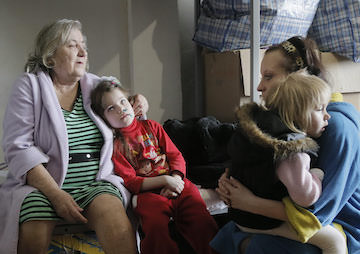
By Halyna Mokrushyna, CounterPunch
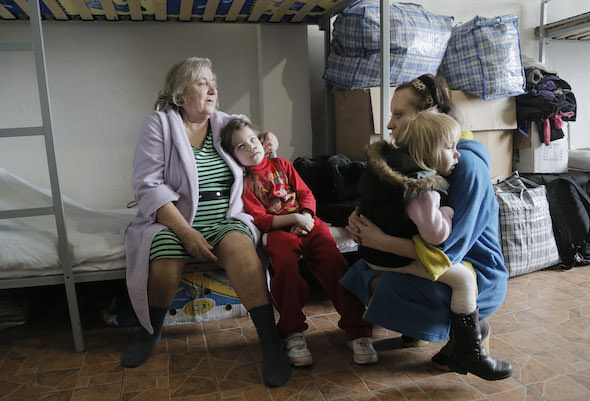
A family rests in a hostel for the internally displaced in Donetsk. Many homes were damaged by bombs and shells launched by the Ukrainian army in 2014. People of means or with family connections have moved out of the area. (AP / Efrem Lukatsky)
This piece first appeared at CounterPunch on April 27.
From April 13 to April 17, 2015, I participated in a press tour to Donbas, the region in eastern Ukraine torn by armed conflict between Ukrainian military forces and local insurgency. The people of Donbas (the region includes the oblasts of Donetsk and Lugansk), rebelled last year against Kyiv’s imposed integration with the European Union and its new, official history and ideology based on extreme and exclusive Ukrainian nationalism.
Donbas has always been a predominantly Russian-speaking region, oriented culturally and integrated economically to Russia. When in February of 2014 the Euromaidan “Revolution” overthrew the elected President Victor Yanukovych, Donbas rejected this overthrow as well as the violence with which it was carried out. Donbas did not recognize itself in this West supported coup-d’état, which was celebrated in the Western and Ukrainian media as a popular revolt against a “corrupted dictator”. Donbas responded with its own protests and demands to hold a referendum on the future of the region. Kyiv answered these legitimate demands by launching an “anti-terrorist” operation against its own people in April 2014.
I saw first-hand these “terrorists” in Donetsk – people who before this fratricidal war were owners of small businesses, miners, university professors, engineers, security service officers, and so on. After Kyiv launched a war against them, they decided that they want to build something different from the oligarchic regime in Kyiv – a new state, free from corruption and nationalism. In Donetsk and in Lugansk, they have created new political entities with emerging governing structures—the Donetsk People’s Republic (DPR) and the Lugansk Peoples Republic.
It is an enormous and difficult task. Ukraine has cut all the supplies to the rebellious region. Russia has not recognized the people’s republics politically, but it does provide them with humanitarian aid. I talked to these courageous people in Donetsk who, in spite of all difficulties, work every day to fulfill their dream. They have created their own banking system, the first old age pensions have been paid as of April 1, students are attending local universities, kids are in public schools, and destroyed infrastructure is being slowly repaired and rebuilt. Resources are scarce, but people of the DPR are doing the best they can under the circumstances.
I talked to elderly women and men living in apartments and houses near the demarcation line of the ceasefire agreement signed in Minsk, Belarus on February 12, 2015. Their homes have been damaged by bombs and shells launched by the Ukrainian army. These are people without the economic means or family connections to move somewhere safer. Those with the means have moved out of Donetsk, either to other regions of Ukraine or to Russia. The city’s population of app. one million is approximately half of what is was before the war. Some are returning, hopeful that the war may be over.
Donbas is trying to return to normal life. However, there are reminders all over the city that the war could return any time. Military guards are stationed at all important administrative buildings. A curfew is maintained from 11 pm to 6 am. Our press tour was accompanied everywhere by three deputies of the parliament of Novorossyia and two members of the local self-defense forces.
They took us to several of the western outskirts of Donetsk near the demarcation line that are damaged by bombings of the Ukrainian army. I was looking at the empty windows of a school, blasted out by shelling, probably last summer when the fighting was at its height. In the school yard, my travel colleagues were picking up splinters of shells. I felt a deep sorrow. I thought to myself: here I am standing at the graveyard of Ukraine as I have known it.
There is no going back. Donbas does not want to be a part of a Ukraine which celebrates the Ukrainian nationalists who collaborated with Nazi Germany during World War Two and against whom the Soviet Army fought. Donbas opposes the neo-liberal capitalism which is destroying Ukrainian industry and agriculture. Donbas would return to a federalized Ukraine, but only if the Kyiv government would undergo what Donbas people call “de-nazification”. Sadly, this is very unlikely to happen. A civilized divorce is the best solution for this armed conflict.
Canada is providing military support to Kyiv. Canada should instead remember its expertise as a peacekeeper and negotiator and put pressure on Kyiv to fulfill the obligations which it undertook when it signed the ceasefire agreement in Minsk, on February 12, 2015, along with the representatives of Lugansk and Donetsk.
Halyna Mokrushyna has written frequently during the past year about the war in eastern Ukraine. Watch for her forthcoming articles on her journey to Donetsk, eastern Ukraine in April 2015. You can find all of her articles on the website of NewColdWar.org. She can be reached at [email protected].
Your support matters…Independent journalism is under threat and overshadowed by heavily funded mainstream media.
You can help level the playing field. Become a member.
Your tax-deductible contribution keeps us digging beneath the headlines to give you thought-provoking, investigative reporting and analysis that unearths what's really happening- without compromise.
Give today to support our courageous, independent journalists.
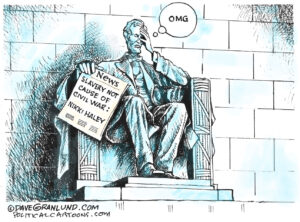

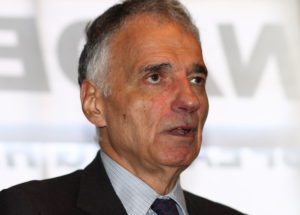


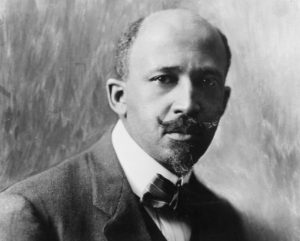
You need to be a supporter to comment.
There are currently no responses to this article.
Be the first to respond.